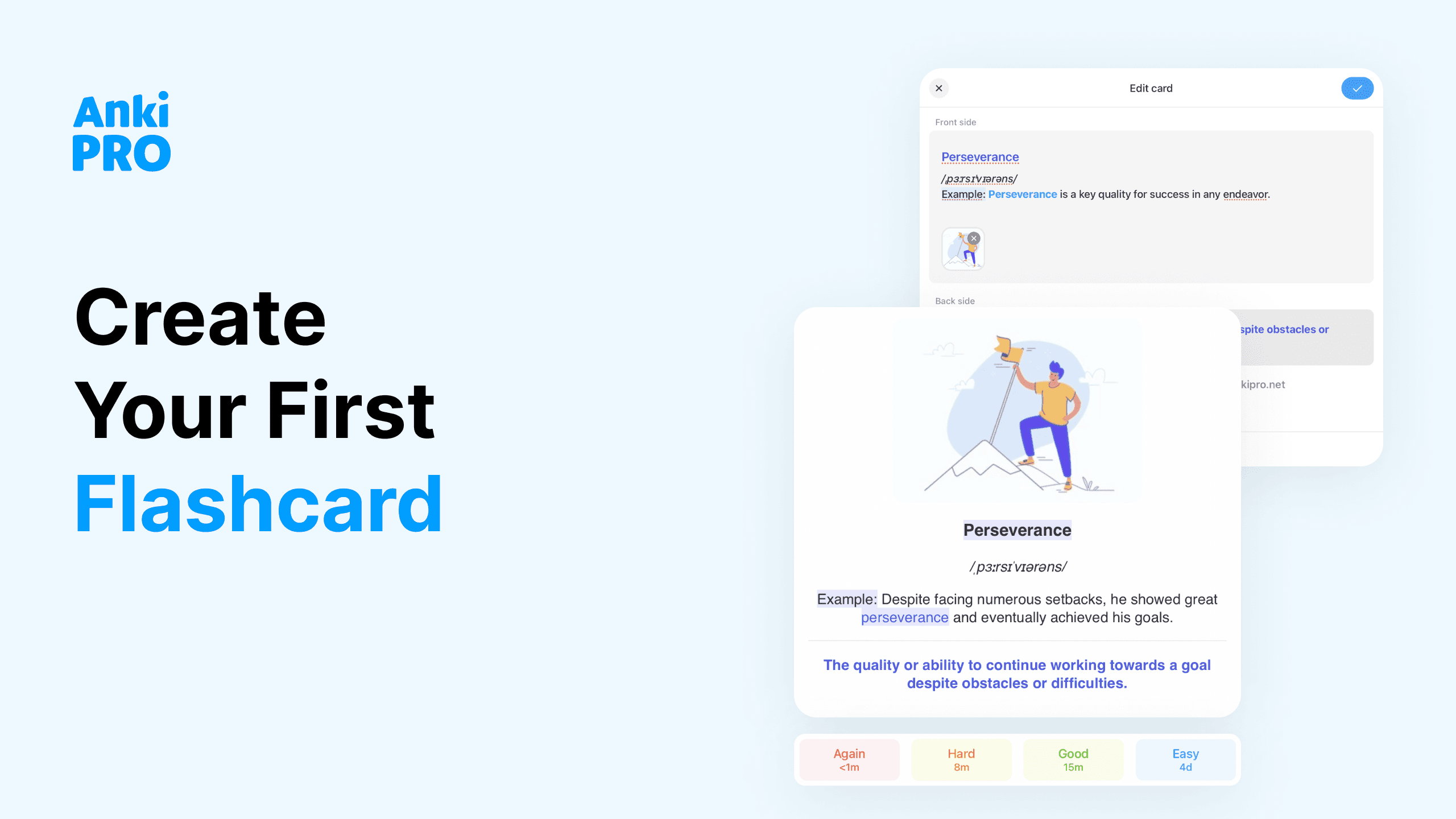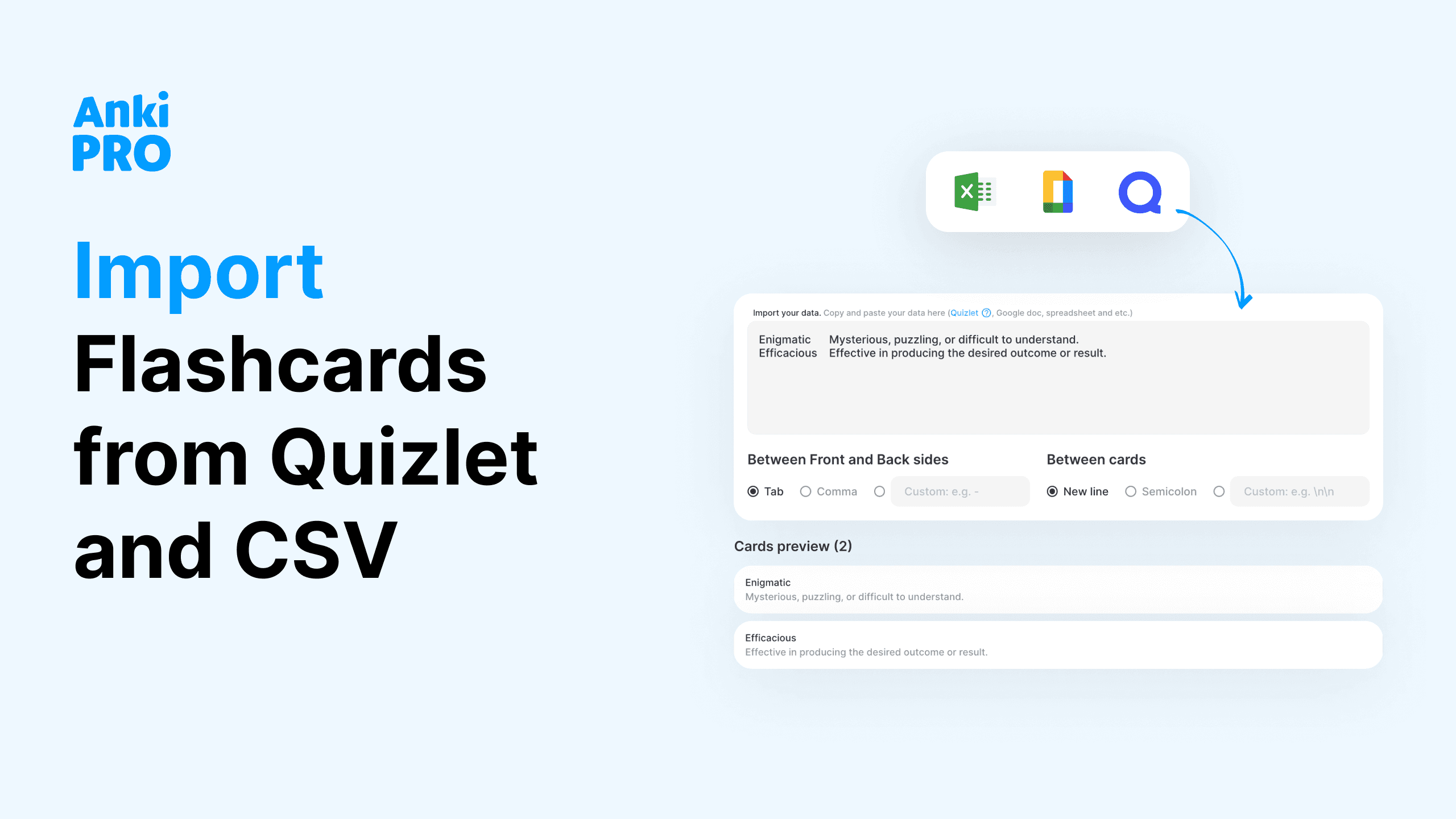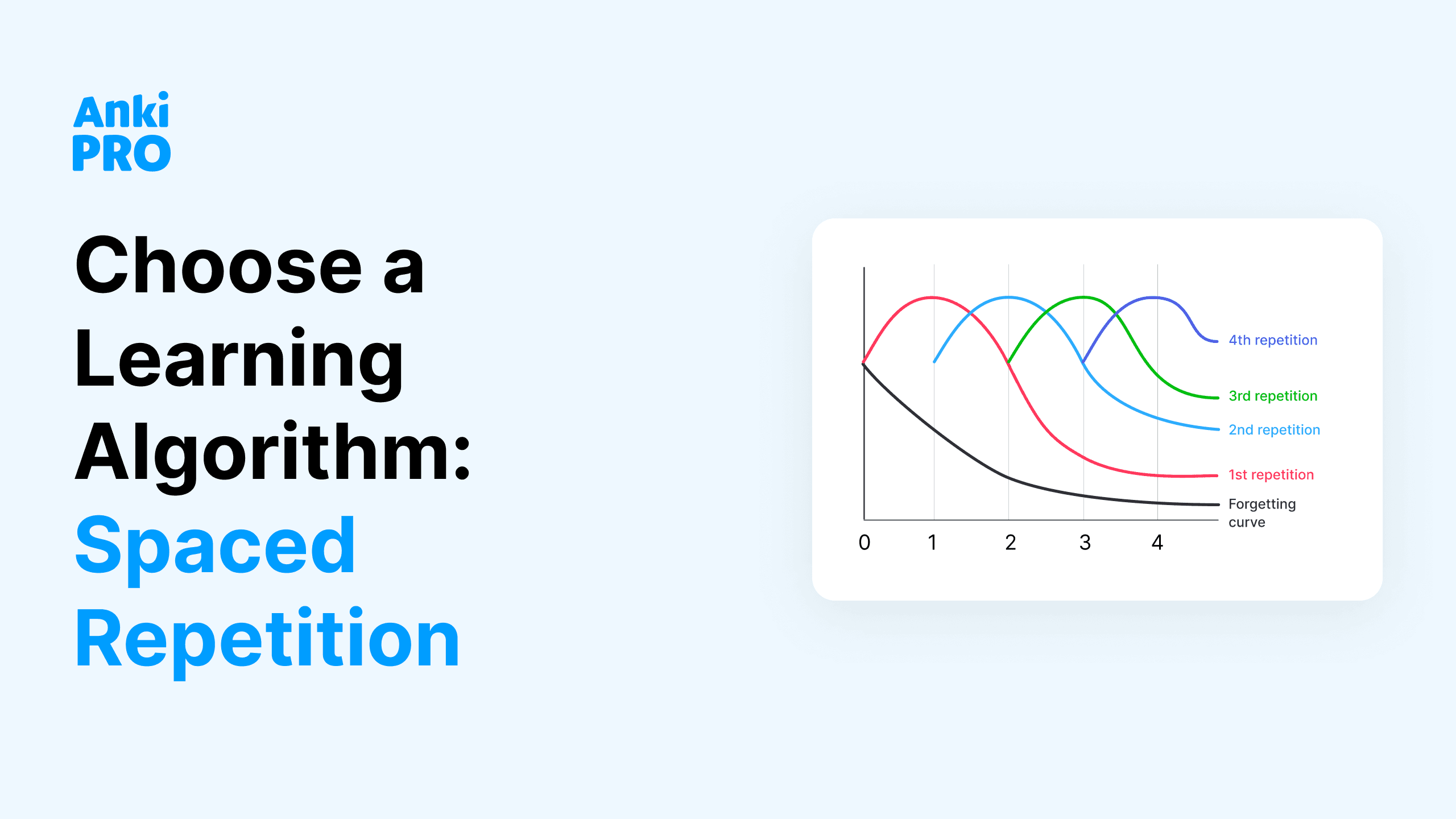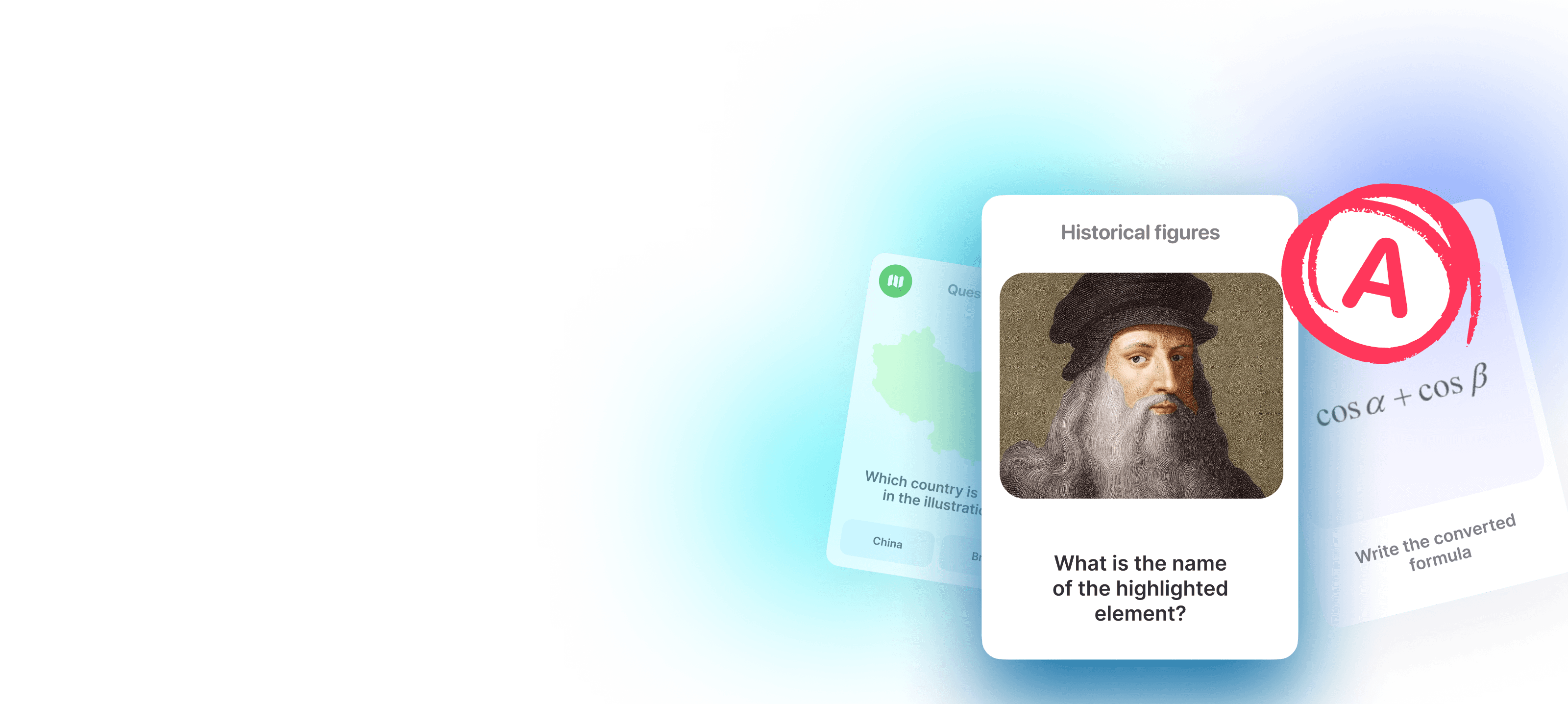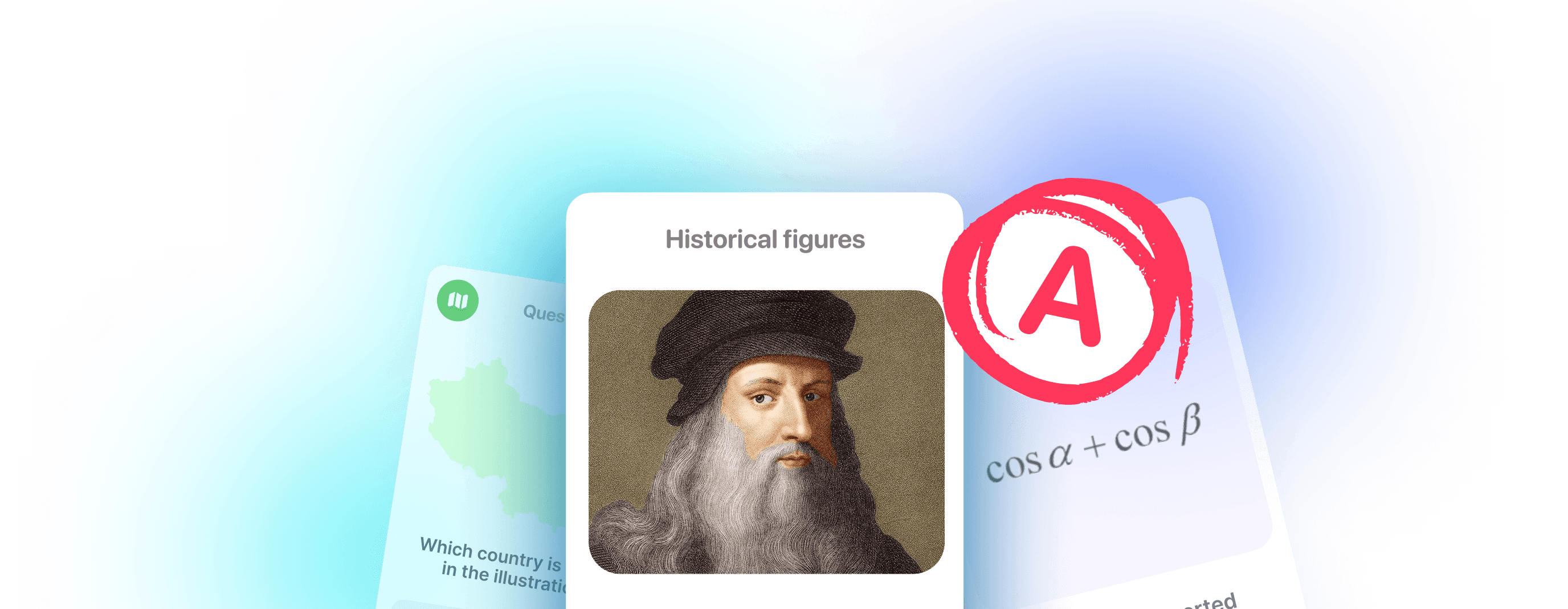From Basics to Fluency: How to Study Languages With Flashcards
“Languages are so hard to learn”, “My memory is so bad”, “I just don’t have a gift for languages” — you probably heard it from many people or even said it yourself. But the thing is that learning languages is a complex skill and you just need to find an approach to master it.
What Are Flashcards
Flashcards are simple learning tools consisting of two sides, typically with a question or prompt on one side and the answer or relevant information on the other. They are used for memorization and active recall practice. Language flashcards often feature vocabulary words, phrases, or grammar rules on one side and their translations, explanations, or pictures on the reverse.
Flashcards can be:
Digital — Available through apps like Anki Pro which can incorporate additional features like spaced repetition, multimedia (images, audio), and interactive quizzes.
Analog — Traditional paper cards, often written by hand or printed.

Are Flashcards Effective for Language Learning
Flashcards are quite a simple instrument but it is effectiveness has been proven by a number of researchers. Language learning flashcards engage learners in active recall, a method proven to strengthen memory. Let’s answer the question do flashcards work for language learning from a scientific perspective.
✔ testing (which occurs with flashcards) improves retention proves 2008 study by Roediger and Butler. The act of trying to recall a word from memory, even if done incorrectly, helps encode it more deeply in the brain than passive review methods like reading or highlighting.
✔ active recall is more effective for vocabulary retention than re-reading or other passive methods, especially when learners are given feedback on their answers, another research demonstrated that
✔ spaced learning, such as the intervals used in flashcard systems, significantly improves memory retention over time compared to cramming or massed learning, another study found.
✔ A 2017 study demonstrated that using spaced repetition to study vocabulary resulted in higher retention rates in language learners, especially when tested weeks or months after the learning period.
So if you still doubting are flashcards effective for language learning, hope this proves to you that they actually work! The remaining question is how do you incorporate them into your study process?

How to Study Languages With Flashcards
What can you study using language learning flashcards?
- Vocabulary
- Alphabet
- Grammar rules
- Common phrases and idioms
All these aspects are important and all together bring you an ability to speak and understand the language. How do you begin with your studies?
Note: Flashcards are memorization tools, they can not replace other aspects of language learning: grammatical exercises, writing, reading, and speaking. They can help you memorize, so you will understand others better and speak with a richer vocabulary.
In a short way:
Do flashcards work for language learning? Yes!
Can you learn the language only with flashcards? No, unfortunately.
Choose: Online or Analog
Online language flashcards are a more modern and automatized solution: you can make more decks, add quality visuals, pictures, and graphics, and even audio to train listening and pronunciation. And what is most important, online applications like Anki Pro have automatic spaced repetition including a special regime for learning vocabulary. The application will create an algorithm, especially for you, and show you cards in a way that you will memorize them in the fastest and most effective way.

Start: Create a Deck
Creating your own decks can be a good solution as you adapt study materials to your learning style and analyze them already during the process of making a deck. With Anki Pro you can create a deck on a website or make them in Google Docs or PDF. Here are some tips for your perfect language deck:
Include Example Sentences
Write an example sentence using the word or phrase. This helps you understand how it’s used in context, making it easier to remember.
Make Decks Logical
Keep your language learning flashcards in a way that makes sense to you. For example, you can put all the food words together. It doesn’t matter how you organize them, as long as it’s clear for you. If you’re using digital language flashcards, use the sorting and tagging options in apps to keep things organized.
Add Pronunciation Tips
Especially if you just starting to learn the language pronunciation is extremely important. Include pronunciation tips or phonetic transcriptions to practice saying the word correctly. Add audio if it is possible.
Use Images
Pair words with pictures, especially for concrete nouns, to create stronger associations in your memory.
Add Both Passive and Active Cards
Mix language learning cards where you recognize words with cards where you have to actively produce them. This reinforces both passive understanding and active recall.
Find more about how to create a deck in this article.

Study With Pre-Made Decks
There are a lot of pre-made decks already created and uploaded into the library. Check out what kind of decks are available and if they answer your requirements and language level. Be sure to check if all the information on the cards is correct because language flashcards are not official study materials and mistakes can happen.
Check out the language decks library here.
How to Organize the Study Process?
Are flashcards effective for language learning? Only if you study properly, don’t just open your app for five minutes per week and expect results. Follow these tips to maximize your experience.
🖊️ Practice Daily
Aim for 15-30 minutes a day. Consistent, short sessions are more effective than cramming in long study periods. Of course, you can study more if you need to prepare for an exam or in case you need to learn a language very quickly.
🖊️ Test Yourself
Actively recall the word or phrase before flipping the flashcard for language learning. This strengthens memory retention and mimics the way you’ll need to use the language in real life.
🖊️ High-Frequency Words Decks
Start with common and frequently used words in the language. Learning the most-used words first gives you a stronger foundation for practice and confidence in speaking.
🖊️ Say It
When you go through your language flashcards, try saying the words and sentences out loud. It’s a great way to get better at pronunciation and boost your auditory memory. Plus, the more you speak the words, the more natural they’ll start to feel when you’re having conversations.

How to Elevate Your Language Skills With Flashcards
Don’t think that flashcards are only for beginner learners. You can use them and improve your level even if you are already quite professional.
🖊️ Don’t Translate Into Your Native Language
As you get more comfortable with a new language, try making language flashcards with definitions in the language you’re learning instead of just using translations. This helps you start thinking in that language, which boosts understanding and fluency. When you link new words directly to their meanings in the target language, you’ll get a much better feel for how they’re used in real contexts. It helps break the habit of always translating in your head and it is one more step into fluency.
🖊️ Create Cards When you Read or Watch Movies
As you meet new vocabulary or expressions in books or movies, just add them to your Anki deck with their definitions. This way, you’re learning from real-life, authentic language use, which makes learning much more interesting.
Plus, it’s a great way to immerse yourself while keeping studies with flashcards for language learning enjoyable and interactive.
🖊️ Focus on Idiomatic Expressions and Phrases
At an advanced level, understanding idioms, slang, and colloquial phrases is key. Create language flashcards with common idiomatic expressions or phrases, their meanings, and example sentences showing their usage in context. Include regional or cultural variations where applicable.
Example:
- Front: “Break the ice”
- Back: “To initiate conversation in a social setting” + Example: “She broke the ice by telling a funny story.”
🖊️ Create Cards for Synonyms and Nuances
At an advanced level, it’s important to distinguish between similar words with subtle differences in meaning. Include in your flashcards for language learning synonyms with examples that highlight the nuances between them. This will help you understand the finer distinctions between similar words.
Example:
- Front: “Accurate vs. Precise”
- Back: “Accurate: Correct or true. Example: ‘Her statement was accurate.’ / Precise: Exact in detail. Example: ‘He gave a precise measurement.'”

At Any Level: Combine Flashcards With Other Methods
Language flashcards focus primarily on memorization, which is a small part of language acquisition.
Are flashcards effective for language learning if you don’t use other learning strategies? No, keep it in mind.
They don’t develop conversational skills, listening comprehension, or the ability to construct complex sentences. You need to expose yourself to the spoken language, whether through conversations, audio lessons, or media like movies, podcasts, and songs.
This helps you understand how native speakers pronounce words, stress sentences, and communicate naturally. And, of course, you need to practice speaking the language. Even if you are a very beginner, try to speak: find a study buddy, join a language exchange group, or find a tutor.
It can be a bit stressful, but the sooner you begin, the sooner you will see the progress.

How to Effectively Study Several Languages With Flashcards
A lot of people now study several languages at the time. For example, improve English to an advanced level, have a beginner’s German, and start to learn Armenian. How not to get mad and not confuse vocabulary and grammar in your head? Just follow some simple rules.
🖊️ Study One Language at a Time
Instead of jumping between languages in one study session with language flashcards, dedicate specific blocks of time to each language. For example, I study English in the morning and German in the evening. Or rotate the languages you study daily: English on Monday, Spanish on Tuesday, German on Wednesday, and repeat. This approach ensures regular exposure to all languages without overwhelming yourself on any day.
🖊️ Make Quick Reviews for Maintenance
If you’re maintaining proficiency in a language, don’t overload yourself with it, separate 5-10 minutes daily for flashcards for language learning reviews to keep it fresh in your mind.
🖊️ Limit the Number of Languages
Learning too many languages at a time can cause confusion and frustration. Focus on two or three at most, so you can dedicate enough time to each one.
Now you know the answer to the question do flashcards work for language learning and how to use them to make your learning process effective.





